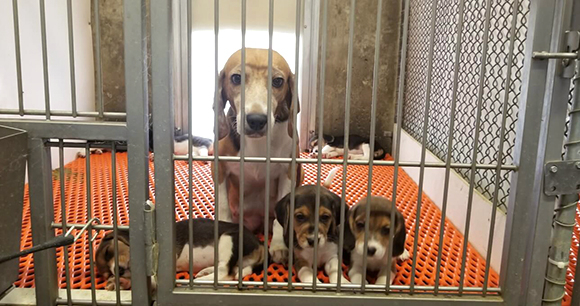
Washington, DC—The Animal Welfare Institute (AWI) is grateful that thousands of dogs will be rescued from abusive conditions following a settlement reached Thursday between the federal government and Envigo, a company that breeds and sells animals for laboratory experimentation.
The consent decree, approved by the U.S. District Court for the Western District of Virginia, permanently prohibits Envigo (a subsidiary of Inotiv, a multinational company that owns more than 60,000 animals) from conducting any further operations at its Cumberland, Virginia, facility that require an Animal Welfare Act (AWA) license. The decree incorporates a transfer plan under which all dogs remaining at the facility will be transferred within approximately 60 days to a variety of shelters. Envigo will provide funds for each shelter to facilitate the care and adoption of these dogs. While the decree resolves the civil claims against Envigo in the government’s complaint, it does not prohibit criminal prosecution at any point. Unfortunately, it also does not prevent Envigo from simply reconstituting its Cumberland practices—whether elsewhere in Virginia or outside the Commonwealth.
“Envigo has displayed a callous indifference to even the bare-minimum animal welfare standards, said AWI President Cathy Liss. “Despite its extensive documentation of abuse, the US Department of Agriculture’s Animal and Plant Health Inspection Service (APHIS) refused for more than 10 months to enforce the AWA. While this settlement closes a painful chapter, we are concerned for the tens of thousands of animals at other Inotiv facilities.
Liss added: “It is incumbent upon APHIS to thoroughly evaluate every Inotiv facility through the use of unannounced inspections, given the company’s abysmal animal welfare record, documented in multiple undercover investigations by animal protection groups.”
In May, federal district court Judge Norman Moon granted the extraordinary relief requested by the U.S. Department of Justice to immediately halt and rectify the AWA violations by the Virginia dog breeding facility. Last month, Judge Moon denied Envigo’s request that it be permitted to continue business operations by selling about 2,200 of the abused beagles—mostly to overseas customers—into next year.
Since July 2021, USDA inspectors have documented more than 60 citations alleging AWA violations at the facility. Among them: Envigo failed to investigate 300 puppy deaths over a seven-month period; food was deliberately withheld from nursing mothers; dogs were euthanized rather than treated, even for minor injuries, and were euthanized by intracardiac injection without anesthesia; 48 dogs were injured and three died from fight wounds; animals were crowded into small, filthy, sweltering cages with food covered in insects and feces; and there was inadequate staffing, including only one full-time veterinarian to attend to thousands of dogs.
Virginia politicians have denounced the beagle supplier, prompting legislative action; in April, the state enacted multiple animal welfare laws intended to better protect dogs and cats bred for research. In May, after APHIS refused to act, the DOJ sued Envigo for violating the AWA and, joined by the Commonwealth of Virginia, seized 446 animals after veterinarians determined that the dogs were “in acute distress.”
On June 13, Inotiv announced that it would shutter the Cumberland facility. At the time, Inotiv reassured investors that the “restructuring and optimization plan” was driven by business considerations, since the cost of needed improvements was not justified by the meager 1% of Inotiv’s total revenue generated by that facility. Inotiv currently holds tens of thousands of monkeys, pigs, rabbits, rodents, and more at its other sites.
Beagles are often bred for sale for experimental purposes because they are small, short-haired, and docile. Envigo’s dogs have been used by researchers at universities, major drugmakers, the National Institutes of Health, and the US Food and Drug Administration. Entities that use Envigo or Inotiv animals for their research should ensure that the animals receive humane treatment—both for the welfare of the animals and the integrity of the research.
“Clearly, these dogs had grossly inadequate care, and they suffered immensely as a result,” Liss said. “Raising animals under these conditions also introduces health-related variables that can skew the results obtained if they are subject to research or testing, calling into question the outcomes.”
Envigo is just the latest example of the USDA’s persistent failure to protect animals, despite extensive documentation of abuse, in deference to business interests. In October 2021, a USDA administrative law judge permanently revoked the license of Moulton Chinchilla Ranch (MCR) in Minnesota after the department had cited MCR for more than 100 violations dating back to 2013. These included animals’ eyes crusted, sealed, swollen shut, bleeding, and oozing fluid; collars embedded in animals’ necks; protruding bones; soiled food; and green drinking water. Yet the USDA failed to confiscate a single chinchilla during this time, and, in 2019, actually helped Moulton with the paperwork to renew his license.
Less than a month later, the USDA revoked the license of Iowa dog breeder Daniel Gingerich, but only after the DOJ filed a complaint for injunctive relief. In 2021 alone, 25 inspection reports exceeding a total of 200 pages contained more than 200 citations against Gingerich. Among the egregious findings, multiple dogs were observed suffering from severe heat stress, with labored breathing and crying out, while others had no potable water.
Margie Fishman, Animal Welfare Institute
[email protected], (202) 446-2128
The Animal Welfare Institute is a nonprofit charitable organization founded in 1951 and dedicated to reducing animal suffering caused by people. AWI engages policymakers, scientists, industry, and the public to achieve better treatment of animals everywhere—in the laboratory, on the farm, in commerce, at home, and in the wild. Follow us on Facebook, Twitter, and Instagram for updates and other important animal protection news.